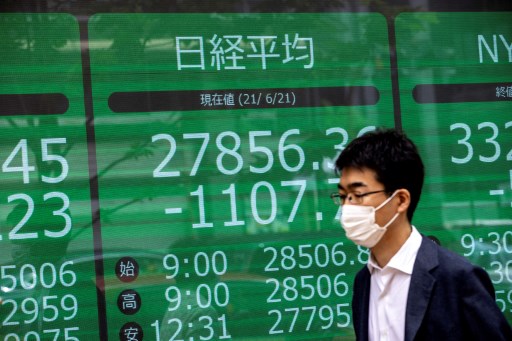
403
Sorry!!
Error! We're sorry, but the page you were
looking for doesn't exist.
Asian stock markets experiences significant decline
(MENAFN) Asian stock markets experienced a significant decline on Monday, driven by growing concerns about a potential United States recession and escalating fears of a broader conflict in the Middle East. The downturn across Asian equities followed a sharp drop in United States stocks, triggered by disappointing employment data.
On the first trading day of the week, major Asian indices suffered substantial losses. Japan’s Nikkei Index fell by more than 13.1 percent by 10:15 am United Arab Emirates time, reflecting a severe impact. The Hang Seng Index in Hong Kong dropped 2.57 percent, and India’s S&P BSE Sensex Index declined 2.83 percent. Technology-heavy markets in Taiwan and South Korea also experienced significant downturns.
In the Gulf Cooperation Council (GCC) region, the Dubai Financial Market’s main equities index fell 4.4 percent, while the Abu Dhabi Securities Market saw a 2.4 percent decrease. Saudi Arabia’s Tadawul, the largest Arab stock exchange, also fell by 2.4 percent. The GCC markets, which had shown relative stability in the previous week, are now reacting to the potential for escalating military conflict and its implications for the global economy.
The rise in geopolitical tensions in the Middle East, particularly the risk of the Israel-Gaza conflict expanding into a wider regional war, is adding to investor anxiety. Analysts are concerned about the potential impact if the conflict spreads beyond its current borders and involves other regional players.
Hasnain Malik, head of emerging markets strategy at Tellimer, highlighted the complexities of the situation. He noted that while the conflict between Israel and Iran already affects multiple countries, including Iraq, Lebanon, Syria, and Yemen, a full-scale war involving Iran would lack clear and achievable objectives. This uncertainty is contributing to heightened volatility in global markets.
On the first trading day of the week, major Asian indices suffered substantial losses. Japan’s Nikkei Index fell by more than 13.1 percent by 10:15 am United Arab Emirates time, reflecting a severe impact. The Hang Seng Index in Hong Kong dropped 2.57 percent, and India’s S&P BSE Sensex Index declined 2.83 percent. Technology-heavy markets in Taiwan and South Korea also experienced significant downturns.
In the Gulf Cooperation Council (GCC) region, the Dubai Financial Market’s main equities index fell 4.4 percent, while the Abu Dhabi Securities Market saw a 2.4 percent decrease. Saudi Arabia’s Tadawul, the largest Arab stock exchange, also fell by 2.4 percent. The GCC markets, which had shown relative stability in the previous week, are now reacting to the potential for escalating military conflict and its implications for the global economy.
The rise in geopolitical tensions in the Middle East, particularly the risk of the Israel-Gaza conflict expanding into a wider regional war, is adding to investor anxiety. Analysts are concerned about the potential impact if the conflict spreads beyond its current borders and involves other regional players.
Hasnain Malik, head of emerging markets strategy at Tellimer, highlighted the complexities of the situation. He noted that while the conflict between Israel and Iran already affects multiple countries, including Iraq, Lebanon, Syria, and Yemen, a full-scale war involving Iran would lack clear and achievable objectives. This uncertainty is contributing to heightened volatility in global markets.

Legal Disclaimer:
MENAFN provides the information “as is” without warranty of any kind. We do not accept any responsibility or liability for the accuracy, content, images, videos, licenses, completeness, legality, or reliability of the information contained in this article. If you have any complaints or copyright issues related to this article, kindly contact the provider above.






















Comments
No comment